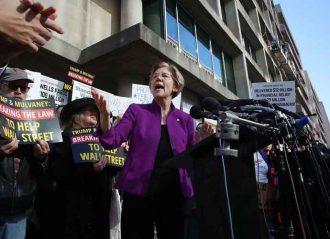Trump To Deny Green Cards To Legal Immigrants Receiving Public Benefits Using “Public Charge” Rule
President Donald Trump‘s administration on Monday issued a new regulation that permits federal officials to deny green cards to legal immigrants who have obtained or may one day receive public benefits.
The new “public charge” rule — reportedly proposed by White House senior adviser Stephen Miller and several other anti-immigrant administration members — marks Trump’s latest effort to curb immigration into the United States as he continues his 2020 re-election bid.
During a White House press briefing Monday morning, acting U.S. Citizenship and Immigration Services Director Ken Cuccinelli lauded the new rule.
WATCH BETO TAKEDOWN TRUMP:
Subscribe to our free weekly newsletter!
A week of political news in your in-box.
We find the news you need to know, so you don't have to.
“President Trump’s administration is reinforcing the ideals of self-sufficiency and personal responsibility, ensuring that immigrants are able to support themselves and become successful here in America,” said Cuccinelli.
The 837-page measure adds to language utilized in 1882 and then again in 1952 in the McCarren-Walter Act that came during the so-called “Red Scare” of communism during the 1950s. This law permits immigration officials to deny visas or permanent resident status to people considered likely to represent a heavy strain on taxpayers.
The new public charge law will be defined as a migrant who “is more likely than not” to obtain one of the listed public benefits for 12 months or longer during a 36-month period
SLIDESHOW: TOP DEMOCRATS RUNNING FOR PRESIDENT IN 2020
Conservative groups like the Heritage Foundation have backed the regulation as a strong way to restrict immigration to migrants who can take care of themselves and not overly rely on public benefits.
On the opposite side, multiple pro-immigrant activists and organizations like the Los Angeles-based National Immigration Law Center, have announced lawsuits and other legal challenges to the rule.
A draft version of the public charge rule was released in October and was met with severe criticism from Democratic lawmakers. Several public health organizations and activists also said they feared the regulation would require parents to surrender basic services for their children. Medicaid, welfare and food stamps are among the benefits covered under the rule, which will go into effect on October 15.
Under the new regulation, enrollment in the Children’s Health Insurance Program would not count toward a public charge determination. Medicaid used by children, pregnant women and new mothers during the first two months after giving birth would also not be considered a public charge. Medicare Part D, a prescription drug subsidy program, is also excluded from the list of restricted benefits.
“DHS finds it difficult to predict the rule’s dis-enrollment impacts with respect to people who are not regulated by this rule, such as people who erroneously believe themselves to be affected,” the final rule, the Department of Homeland Security said of the regulation in a statement.
Among the foreigners who are exempt from the public charge criteria are refugees and other asylum seekers, as well as some domestic violence victims and children who qualify for “special immigrant juvenile status,” underage children who were abused or abandoned by a parent.
Get the most-revealing celebrity conversations with the uInterview podcast!





 Click here for the Top Democrats Running For President Against Trump In 2020 Slideshow
Click here for the Top Democrats Running For President Against Trump In 2020 Slideshow


Leave a comment